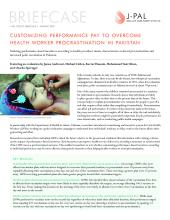Customizing Performance Pay to Overcome Health Worker Procrastination in Pakistan
Tailoring performance-based incentives according to health providers’ innate characteristics reduced procrastination and increased polio vaccination in Pakistan.
Key results:
- Individually-tailored vaccination incentive plans were more effective than more generic ones. On average, LHWs who were offered vaccination plans with incentives designed to overcome their personal tendency to procrastinate were 10 percent away from equitably allocating their vaccinations across days one and two of the vaccination drive. Those receiving a generic plan were 15 percent away. LHWs receiving personalized plans also made greater progress toward their vaccination targets.
- Health workers demonstrated a tendency to procrastinate. LHWs who decided three days in advance of the vaccination drive how to allocate their vaccination targets were more likely to more equitably distribute the targets, on average allocating 146.5 vaccines to the first day. Those making this decision on the morning of the drive were likely to allocate two to three fewer vaccinations to the first day and more to the second.
- Health workers varied in the extent to which they allocated vaccinations to the second day relative to the first. While most LHWs preferred to vaccinate more on the second day regardless of when they made their allocation decision, their preferences ranged from equating 0.75 vaccinations on day one for every one vaccine on day two (showing a tendency to procrastinate) to equating 1.5 vaccines on day one with one vaccination on day two (preferring to front-load their vaccinations and not procrastinate).
